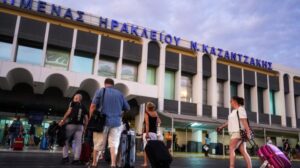Hello! Today we wrap up for the first round of Christmas holidays with warm wishes to all our readers—for health, happiness, and peace of mind. May there be less “toxic material” around us. As I close with these wishes, I can’t help but comment on something that doesn’t annoy me but… amazes me. It surprises me how this mysterious lot—mostly stemming from the toxic old SYRIZA and its offshoots—concerns itself with everyone else’s business but their own. They’re bothered by what journalists and media write, who the President of the Republic is photographed with (though Pavlopoulos was, of course, a man of the institution!), and why the former royals got citizenship after 50 years, even though any other citizen who meets the criteria gets it after eight years. Really, what’s simpler? If you don’t like what you see or read somewhere, just don’t look at it or read it again. On the other hand, everyone who writes or speaks publicly is subject to criticism—that’s fair—but not to the verbal abuse of every random person. Anyway, with social media, the situation got out of hand years ago, and it keeps getting worse. This is especially because those controlling the major platforms, like the great and mighty libertarian businessman Mr. Elon Musk, who owns X, deliberately allow armies of trolls to defame people or anonymously spread every fake and deepfake news story imaginable, without any legal consequences.
Melomakarona and Kourabiedes
Yesterday’s Cabinet meeting, the last of the season, was festive. Instead of the usual treats (some cookies), Maximos Mansion served melomakarona and kourabiedes. I’m told the ministers, whether because of dieting or… being stuffed from holiday feasts, were rather sparing in their indulgence. As for the meeting itself, while it was meant to last no more than two hours, discussions stretched past three hours, thanks to presentations by Akis Skertsos on the “blue folders” for 2025 and the bills from Dendias and Pierrakakis.
Government Break
Today, K.M. will hear carols at Maximos Mansion and then “close shop” at the office for a few days to spend time with his family until Sunday. He’ll also head to Chania (which has mountains, so there are thoughts of hiking, etc.). He’ll return Sunday since next Monday is fully booked, starting with announcements on digital addiction among minors.
The Gift for Pierrakakis
One amusing moment from yesterday’s Cabinet meeting was when Mitsotakis, as the session was wrapping up, pledged to give Education Minister Kyriakos Pierrakakis a Christmas gift: a book on Japan’s reforms in the education system. After all, the Japanese are known for being ahead in many things.
Mitsotakis in Ankara
While Prime Minister Kyriakos Mitsotakis’s visit to Ankara has not yet been scheduled and is likely postponed to February, another significant meeting has been set. On January 8, the Trilateral Summit of Greece, Egypt, and Cyprus will take place in Cairo. This summit is particularly interesting due to developments in Syria and the concerns of the Arab world about shifts in regional balances and Turkey’s growing role. Athens is closely monitoring developments, as any escalation in Syria could lead to new tensions and refugee flows, not to mention the possibility of a Turco-Syrian Memorandum aimed at Cyprus’s Exclusive Economic Zone and reinforcing the “Blue Homeland” doctrine. Egypt and President Al-Sisi are key players in the region, and it’s worth noting that Egypt condemned the Turkey-Libya Memorandum in a letter to the UN. For Greece, this trip holds additional importance as it sends another message of support for energy cooperation between the three countries in the Eastern Mediterranean.
Tsamaz’s Move
Forgive me if I offend anyone, but given his professional trajectory, I find it hard to believe that Michalis Tsamaz’s decision to take on the role of Chairman of Uni Systems is not part of a broader business plan. I believe it is—and not just any plan, but a “premier league” one, which we’ll see unfold in 2025. This plan likely involves corporate mergers, as I think the engagement has already happened.
EEEP, Piladakis’s Casino Licenses, and the Chionis Family’s Involvement
In the first half of January, the Gaming Commission will convene to formally reject the request by Invictus and La Mer to transfer shares owned by K. Piladakis in the casinos of Corfu, Thrace, and Rio. The next step will be to examine the legal basis for suspending operations (the Rio casino has already been suspended). The Vourliotis investigation established that behind the casino transfer scheme was businessman Piladakis, while eight individuals and five companies are under scrutiny overall. The Anti-Money Laundering Authority’s investigation also revealed the involvement of the Chionis family in the case. These are companies linked to the descendants of the well-known contractor Nikos Chionis (formerly of METON-ETEP by Arfanis-Chionis), who are listed as the owners of the Porto Rio Hotel, where the Rio casino operates. Sources say that due to the significant debts from Piladakis’s company running the casino, the Chionis family was “persuaded” to get involved. However, other sources claim they were fully aware of the venture, which would have been carried out if not for evidence emerging about offshore companies linked to Piladakis. These companies, though not officially connected, transferred funds to Invictus and La Mer, which purchased the loans of the three casinos. The story is deeply tangled, with many angles and implications. All this is happening as there is increased activity regarding the Gaming Commission’s board tenure.
We found a channel
A communication channel for financial matters with the Trump administration has indeed been established. Yesterday, it was announced that Stephen Miran would take over as head of the Economic Council. Miran had served as a senior advisor at the Treasury Department during Trump’s first term and currently works for Hudson Bay Capital Management. Miran is acquainted with Alexis Patelis, as he succeeded him as chief economist at the hedge fund PSQR in 2009. Following yesterday’s news, email exchanges were made, thus opening a line of communication. The Economic Council, led by Miran, convenes at the White House and advises the President on U.S. and global economic issues.
The Petalioi Islands and lawsuits
Another episode has been added to the long-running “series” of disputes between Mari Empirikos and the Karnesi family, based on recent developments. According to sources, the company “Ktema Petalioi,” which manages the island complex known as the “Greek Maldives” in southern Evia, received yet another lawsuit from Mari Empirikos. This lawsuit, filed on November 27, 2024, with the Single-Member Court of First Instance of Athens, seeks to annul the decision made during the Regular General Assembly of “Ktema Petalioi” shareholders on September 9, 2024. It is unclear what this decision pertains to. However, the dispute between the two parties revolves around the recognition of Mari Empirikos’ shareholder rights. It should be noted that in recent years, leadership of the company has passed to the younger generation of the Karnesi family, specifically to the children of shipowner Spyros Karnesis, Nikola, and Angelique. What is certain is that this saga will continue…
The jitters of directors
The tenure of the management team at ADMIE (Independent Power Transmission Operator) remains solid for the next four years. Yesterday, in the spirit of Christmas, the team congratulated the general directors with whom they will work closely in steering the company forward. For days, ADMIE had been abuzz with anticipation since, until Friday, only two positions were considered “sure bets” to remain unchanged. At least one general director position was undecided until the last minute, as the “reshuffle,” much like ministerial appointments, often involves rejections, negotiations, and various pressures. Over the weekend, all objections were resolved, so as of today, everyone is back to their respective roles. And so, nearly everyone is satisfied, looking ahead to a future full of challenges!
ETBA Industrial Areas to distribute dividends
For the first time in many years, ETBA Industrial Areas (ETBA VI.PE) has managed to close the year with a profitable performance (over €4 million after taxes) and without significant debt obligations. Moreover, it will distribute dividends to its shareholders. ETBA VI.PE, in which the Greek state holds a 35% stake, is an affiliate of the Piraeus Bank Group. Established in 2003 following the spin-off of the Industrial Areas Division from ETBA Bank during its acquisition by Piraeus Bank, ETBA VI.PE focuses on the design, development, exploitation, and management of 27 industrial zones (VI.PE – VE.PE – VIO.PA.) and business parks (E.P.) that house 2,285 businesses employing over 30,000 workers. By 2025, ETBA VI.PE plans to complete a significant investment project worth over €50 million to upgrade these industrial zones ahead of the timelines set by the Recovery and Resilience Facility. Its next goal is to bid for the €100 million Regional Civil Protection Centers, for which ETBA already possesses the necessary plots of land.
The issue with “forested” agricultural lands
Among the numerous complex issues occupying the Ministry of Environment lately, a significant one has emerged: how can cultivated land be reclassified from “forested”? In many cases, wild forest trees have grown on agricultural land, leading to cultivated properties being designated as forested and subsequently taken away from their owners. There are instances where perfectly valid agricultural lands, previously recognized by the state as legitimate (even receiving subsidies), were adjacent to forested areas and were collectively classified as forested due to their proximity. The reclassification system is highly bureaucratic, involving overlapping services and committees, causing added hassle and delays. Proposals have been submitted for a fast-track reclassification process to return these lands to professional farmers, enabling them to increase production and help reduce prices.
A slot opens in the FTSE25 Large Cap
TERNA Energy bids farewell to the Athens Stock Exchange as its remaining shareholders are selling their shares to Masdar (Hellas). This means that a spot opens in the FTSE25 Large Cap index of the 25 largest companies. INTRAKAT, now transitioning into “Aktor S.A. Holdings, Technical, and Energy Projects,” is a candidate for filling the vacancy. The company meets the criteria, having already exceeded a market capitalization of €780 million yesterday and trading at a price 12% higher than the same period last year. Approximately 26% of its share capital is in free float.
Semi-Holiday Stock Market
Only those in urgent need to sell, aiming to increase the liquidity of their portfolios, were active in yesterday’s stock market session. Buyers waited at low levels, stepping in only when they felt sellers had reached their limits. PPC, Coca-Cola, TITAN, and CENERGY were the stocks that kept market morale high, while banks suffered from the so-called “Christmas sales.” With a three-day holiday ahead (trading resumes on Friday), there were no strategic investment moves. The General Index closed below 1,450 points (at 1,448.86, down -0.25%), and the total transaction value reached €87.7 million, including €8.9 million in block trades. The stock of National Bank reflected the general market sentiment. It started strong (+1.4%) with light trading, aiming to reach €8.00, but sellers appeared from everywhere, causing the price to plummet by -3.75% to €7.56, where cautious buyers re-entered. All systemic banks suffered from “forced sales,” while PPC (+2.3%) at €11.87, Cenergy (+2.03%) at €9.3, and Coca-Cola (+1.37%) at €32.6 stepped in to stabilize the Index. GEK TERNA reached €18.42 (+1.21%), VIOHALCO gained +1.14%, and TITAN returned to €40.00 (+1.01%). In the mid-cap sector, INTRAKAT rose by +1.24%, Lavipharm, which seems to have an announcement coming, gained +3.1%, and Dimand, with limited trades, improved by +2.3%.
Competitive Currency Devaluations and Revaluations
In January 2025, the board meetings of the two major central banks align chronologically. On Thursday, January 30, the European Central Bank’s board convenes, while the Federal Reserve’s Open Market Committee meeting begins the same day, with Jerome Powell announcing its outcomes on Friday, January 31. By that time, many global changes will have occurred, notably Donald Trump’s official assumption of power. Trump favors a strong dollar, but with a weak euro, Eurozone countries will suffer from imported inflation. Meanwhile, China is deliberately devaluing the yuan, and Canada is struggling to emerge from economic stagnation and high unemployment. To date, 74% of the world’s central banks have reduced interest rates and the cost of borrowing. The Bank of Canada has cut rates five times by a total of 175 basis points, marking the most aggressive rate-cutting cycle among major central banks. The European Central Bank and the Swiss National Bank have each cut rates four times by 100 and 125 basis points, respectively. The Bank of England has made two cuts totaling 50 basis points. The critical question for central bankers is whether these rate cuts fuel inflation without significantly boosting growth. For professional investors in forex markets, central bank rate divergence creates ample opportunities for complex trading strategies. This marks the beginning of a new cycle of competitive currency devaluations and revaluations.
Tough Christmas in Germany
In Germany today, Christmas Eve, electricity prices will exceed €100 per megawatt-hour. The weather is cold, but the winds are not aiding renewable energy production. At this time of year, Germans often use the term “Dunkelflaute” (a lull in solar and wind energy production) to justify the fact that the world’s third-largest economy, according to the German Central Bank, will shrink by -0.2% in 2024. This is the second consecutive year of contraction for the German economy (-0.1% in 2023), a phenomenon not seen since 1999.
Nordstrom Exits Wall Street
The Nordstrom department store chain is well-known primarily in North America. Founded as a shoe store in 1901, it evolved into a department store and then into a chain of upscale department stores offering a wide range of luxury clothing and accessories at over 350 locations (Nordstrom, Nordstrom Local, and Nordstrom Rack). Its partner, El Puerto de Liverpool, operates two other department store chains, Liverpool and Suburbia, and owns 29 shopping malls throughout Mexico. Yesterday, Nordstrom’s management announced it would be delisting from the stock market. The Nordstrom family is paying minority shareholders $24.25 in cash per share, believing the company will be “more successful without the scrutiny and demands of the public market.” The buyout deal is valued at approximately $6.25 billion, jointly funded by the Nordstrom founding family and the Mexican department store chain El Puerto de Liverpool. Under the agreement, the Nordstrom family will hold a majority 50.1% stake, while Liverpool will own 49.9%. This is not Nordstrom’s first attempt to leave the stock market; a similar effort in 2018 was unsuccessful. The rationale behind this move is that luxury retail stores are under pressure, unable to meet the expectations of a highly demanding capital market like the U.S., which craves spectacular revenue and profitability performances.
Ask me anything
Explore related questions





